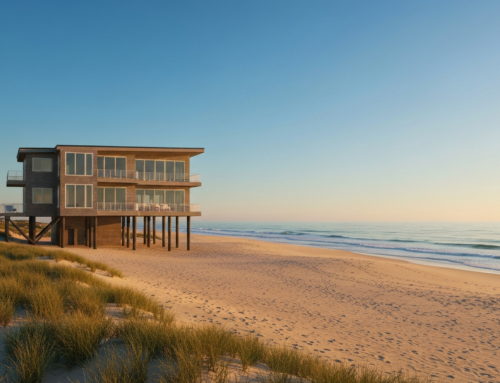The Excitement of Homeownership: Why Insurance Is Key
Buying your first home is an exhilarating milestone, marking a new chapter filled with possibilities. As you step into this significant investment, understanding how to protect it becomes paramount. This comprehensive First Time Home Buyers Insurance Guide 2025 is designed to demystify homeowners insurance, ensuring your dream home is safeguarded from the unexpected.
Homeowners insurance acts as a vital financial safety net, protecting your property and assets from various perils. Without it, you could face immense financial strain if your home is damaged or if someone is injured on your property. It’s more than just a policy; it’s peace of mind for your most significant asset.
Understanding Your Lender’s Home Insurance Requirements
If you’re securing a mortgage, your lender will almost certainly require you to have homeowners insurance. This isn’t just a suggestion; it’s a mandatory safeguard for their investment. Lenders need assurance that if a disaster strikes—like a fire or severe storm—the property can be rebuilt or repaired, protecting their financial stake. Often, your insurance premiums will be included in an escrow account, simplifying your monthly payments by combining them with your mortgage and property taxes. This arrangement ensures consistent payments and eliminates the worry of missing a due date.
Even if you’re paying cash for your home, obtaining homeowners insurance is highly recommended. While not legally required without a mortgage, it offers critical protection that could save you from devastating out-of-pocket expenses in the event of unforeseen damage or liability claims.
Decoding Homeowners Insurance: Core Coverages for Your New Property
A standard homeowners insurance policy, typically an HO-3 policy, provides a comprehensive shield for your home and belongings. Understanding its core components is crucial for every first-time homeowner:
- Dwelling Coverage: This is the foundation of your policy, protecting the physical structure of your home and any attached structures like a garage or porch. It covers the cost to rebuild or repair your house due to covered perils.
- Other Structures Coverage: Separate structures on your property, such as detached garages, sheds, or fences, fall under this coverage.
- Personal Property Coverage: Your belongings—from furniture and electronics to clothing and jewelry—are protected under this section. It covers their loss or damage, even if they’re not in your home (e.g., stolen from your car). It’s wise to create a home inventory to accurately assess your possessions.
- Personal Liability Coverage: This is an essential protection for first-time homebuyers. It covers legal fees and medical expenses if someone is injured on your property and you are found liable, or if you accidentally cause property damage to others. Learn more about home insurance liability coverage.
- Medical Payments to Others: This covers minor medical expenses for guests injured on your property, regardless of fault.
- Additional Living Expenses (ALE) Coverage: Also known as “loss of use” coverage, ALE helps pay for temporary housing, meals, and other increased living costs if your home becomes uninhabitable due to a covered event.
It’s important to remember that standard policies have exclusions. For instance, flood and earthquake damage are typically not covered and require separate policies.
Beyond Standard Policies: Essential Add-ons for First-Time Homeowners
While a basic HO-3 policy offers broad protection, specific situations may call for additional endorsements or separate policies to ensure comprehensive coverage:
- Flood Insurance: If your home is in a high-risk flood area, your lender will likely mandate flood insurance. Even in low-to-moderate risk areas, flood damage can occur. The National Flood Insurance Program (NFIP) is a primary provider, but private flood insurance is also available.
- Earthquake Insurance: For homes in earthquake-prone regions, this separate policy is crucial.
- Sewer Backup and Sump Pump Overflow: Standard policies often exclude damage from sewer backups or sump pump failures. An endorsement can cover the cost of water damage from these events.
- Extended or Guaranteed Replacement Cost: This provides additional coverage beyond your dwelling limit, which can be invaluable if rebuilding costs soar after a widespread disaster.
- Scheduled Personal Property: For high-value items like jewelry, art, or collections, this add-on provides broader coverage and higher limits than your standard personal property coverage.
- Ordinance or Law Coverage: If local building codes have changed since your home was built, this can cover the extra cost of rebuilding to meet current standards.
- Umbrella Insurance: This provides an extra layer of liability protection beyond your home and auto policies, especially beneficial if your assets exceed your standard liability limits.
Consider your unique risks and consult with your insurance provider to tailor a policy that truly protects your new home. For more on common add-ons, see resources like this guide.
How to Shop for the Best Home Insurance Policy
Navigating the home insurance market can seem daunting for first-time buyers, but a strategic approach can lead to significant savings and optimal coverage. Here’s how to shop wisely:
- Start Early: Begin comparing quotes at least 30 days before your closing date. This gives you ample time to research, compare offers, and avoid last-minute stress. Some insurers even offer early quote discounts.
- Compare Multiple Quotes: Don’t settle for the first quote you receive. Rates can vary significantly between providers for the same coverage. Obtain quotes from several companies to find the most competitive pricing.
- Understand Coverage Levels: Ensure you’re comparing apples to apples. Know the maximum payouts for your dwelling, personal property, liability, and additional living expenses. It’s crucial to insure your home for its replacement cost, not its market value.
- Check Company Reputation: Look into an insurer’s financial stability ratings from agencies like A.M. Best or Standard & Poor’s. Also, check customer satisfaction ratings and claims handling reviews on sites like Consumer Reports or the Better Business Bureau.
- Ask About Discounts: Many insurers offer discounts for various factors, such as bundling policies (home and auto), having a new home, installing security systems, or being claims-free.
The goal is to find a balance between comprehensive coverage and an affordable premium. Don’t sacrifice essential protection just to save a few dollars.
Your Essential First Time Home Buyers Insurance Guide 2025 Checklist
To help you stay organized during the home insurance process, here’s a checklist tailored for first-time homeowners:
- Obtain at least three home insurance quotes from different providers.
- Confirm that dwelling coverage is based on your home’s replacement cost.
- Review personal property coverage limits and consider adding scheduled personal property for valuables.
- Assess your liability needs and consider an umbrella policy if necessary.
- Understand your chosen deductible amount and its impact on premiums and potential claims.
- Inquire about discounts, especially for bundling home and auto insurance.
- Check the insurer’s financial strength ratings and customer service reviews.
- Confirm the policy start date aligns with your closing date.
- Store a copy of your policy in a safe, accessible place.
Key Factors That Influence Your Home Insurance Premium
Several variables contribute to the cost of your homeowners insurance. Understanding these factors can help you make informed decisions and potentially find savings:
- Location: Your ZIP code plays a significant role, as it reflects local crime rates, proximity to fire services, and susceptibility to natural disasters (e.g., hurricanes, wildfires).
- Home Characteristics: The age, construction type, square footage, and even the type of roof your home has will affect your premium. Newer homes with updated systems generally have lower rates. You can find more information about factors impacting your costs here.
- Deductible Amount: Choosing a higher deductible (the amount you pay out-of-pocket before your insurance kicks in) will typically lower your premium. However, ensure you can comfortably afford your deductible in the event of a claim.
- Claims History: A history of frequent claims, even minor ones, can lead to higher premiums.
- Credit-Based Insurance Score: In most states, insurers use a credit-based insurance score to assess risk. A higher score often translates to lower premiums. Policygenius provides more details on this.
- Safety and Protective Features: Homes equipped with security systems, smoke detectors, sprinkler systems, and impact-resistant features often qualify for discounts.
- Dog Breed: Some insurance companies have restrictions or higher premiums for certain dog breeds considered “high-risk” due to bite liability concerns.
Smart Strategies to Potentially Save on Your Home Insurance
As a first-time homeowner, managing costs is important. Here are some smart strategies to potentially lower your insurance premiums:
- Bundle Policies: Insuring your home and auto with the same company can result in significant multi-policy discounts. Many clients save big by choosing to bundle home and auto insurance with Beach Insurance LLC.
- Increase Your Deductible: As mentioned, a higher deductible means a lower premium. Just be sure it’s an amount you can afford if you need to file a claim.
- Improve Home Security: Install a monitored home security system, deadbolts, and smoke detectors. These features reduce risk and often qualify for discounts.
- Maintain Your Home: Regular maintenance, such as updating electrical systems or plumbing, can prevent costly damage and signal a lower risk to insurers. Learn about vital homeowner maintenance tips.
- Shop Around Annually: Even if you’re happy with your current insurer, comparing quotes each year can ensure you’re still getting the best rate. Rates can change due to various market factors.
- Ask About All Available Discounts: Don’t assume you’re getting every discount. Always ask your agent about all possible savings, including those for new construction, being claims-free, or having a non-smoking household.
Frequently Asked Questions for New Homeowners
Do I have to buy insurance for my first home?
While not a legal requirement across the U.S., virtually all mortgage lenders require homeowners insurance to protect their investment. Even if you don’t have a mortgage, it’s strongly recommended to protect your significant financial asset from unexpected damages and liability risks.
What is an HO-3 policy?
An HO-3 policy, or “Special Form” policy, is the most common type of homeowners insurance. It provides “all-risks” coverage for your dwelling (meaning it covers everything unless specifically excluded) and “named perils” coverage for your personal belongings (meaning it only covers perils explicitly listed). You can find more information about types of homeowners insurance policies.
How much homeowners insurance do I need?
You need enough dwelling coverage to rebuild your home completely at current construction costs, which can differ significantly from its market value. You also need sufficient personal property coverage for your belongings and adequate liability coverage to protect your assets in case of a lawsuit.
Can I get a discount for first-time home insurance?
While there isn’t typically a specific “first-time homeowner” discount, you may qualify for discounts like multi-policy (bundling home and auto), new home construction, claims-free history, and protective device discounts. Always discuss these with your insurance agent.
Protecting Your Dream Home with Beach Insurance LLC
Embarking on the journey of homeownership is an exciting time, and ensuring your new property is properly protected is a crucial step. With this First Time Home Buyers Insurance Guide 2025, you’re better equipped to understand the landscape of homeowners insurance.
Beach Insurance LLC is dedicated to helping first-time homebuyers navigate the complexities of insurance with ease. We understand the unique needs of new homeowners and are committed to finding the right coverage that fits your lifestyle and budget. Our goal is to provide reliable, comprehensive protection so you can enjoy your dream home with confidence.
Whether you’re looking to understand specific coverages like loss of use or simply want to explore your options, Beach Insurance LLC is here to assist. We offer personalized guidance to ensure your policy provides the security you deserve.
Visit our Contact Us page.






